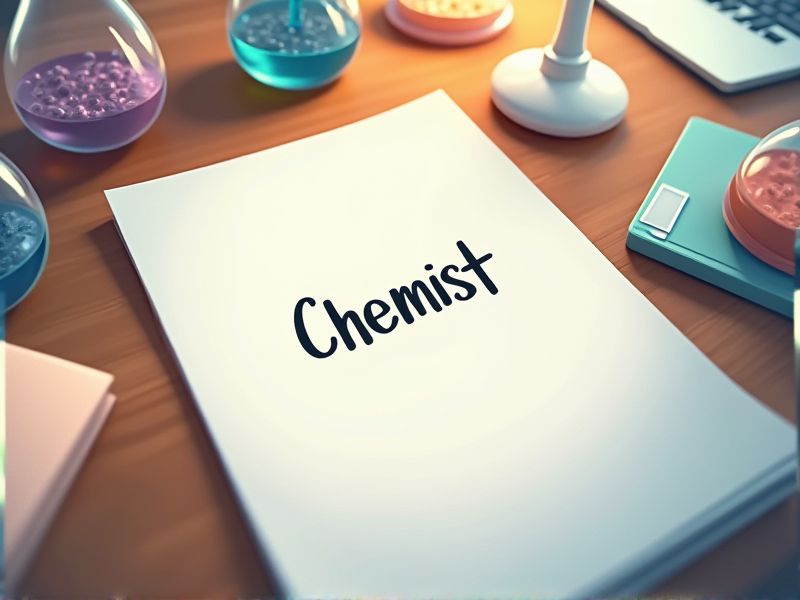
Chemists often work with potentially hazardous materials and complex chemical processes, making safety and compliance vital. Specific certifications ensure they have the knowledge to handle chemicals responsibly and respond to emergencies effectively. These credentials also demonstrate a chemist's commitment to professional standards and continuing education. Important certifications for chemists include those in chemical safety, laboratory analysis, and quality control.
ACS Certified Chemist
ACS Certified Chemist status elevates a chemist's credibility due to rigorous standards set by the American Chemical Society. This certification ensures the chemist possesses a comprehensive understanding of both theoretical and practical chemical knowledge. Employers often prefer candidates with ACS certification because it reflects a commitment to continuous education and professional development. In critical industries, such as pharmaceuticals and environmental science, the assurance of quality and competence reduces risks associated with chemical processes.
Certified Chemical Technician (CCT)
A Certified Chemical Technician (CCT) is needed for chemists to ensure accuracy and reliability in experimental procedures and data analysis. CCTs provide crucial support in maintaining and calibrating laboratory equipment, minimizing errors and increasing the efficiency of chemical processes. Their expertise in safety protocols helps mitigate risks associated with handling hazardous materials, protecting both personnel and the integrity of research findings. Their certification demonstrates a recognized standard of competence, which enhances the credibility of the chemist's work and contributes to informed decision-making in chemical research and industrial applications.
Hazardous Materials Certification
Hazardous Materials Certification ensures a chemist is equipped with the necessary knowledge to handle dangerous substances safely, reducing workplace accidents. Regulatory compliance mandates such certifications, aiming to protect both personnel and the environment from potential risks. Insurance and liability considerations often necessitate certified expertise, minimizing the likelihood of costly incidents. Certification enhances a chemist's competence and credibility, often leading to more job opportunities and career advancement in fields dealing with hazardous materials.
Good Laboratory Practices (GLP) Certification
Good Laboratory Practices (GLP) Certification ensures chemists adhere to consistent and reliable standards, minimizing errors in experimental results. Regulatory bodies often require GLP certification to validate and accept test data, facilitating smoother approval processes for products. It enhances the credibility and reputation of both individual chemists and their organizations in the scientific community. GLP certification also fosters a culture of accountability and transparency, reducing risks of data manipulation or misinterpretation.
Good Manufacturing Practices (GMP) Certification
Good Manufacturing Practices (GMP) certification ensures that chemists adhere to universally recognized standards, enhancing product safety and quality. It builds consumer trust by demonstrating that products are consistently produced and controlled according to quality standards. This certification helps in compliance with legal requirements, reducing the risks of regulatory breaches and associated fines. It also optimizes operational processes, minimizing waste and improving cost efficiency.
Certified Quality Auditor (CQA)
Certified Quality Auditors (CQAs) are critical in chemistry due to their expertise in evaluating systems and processes to ensure compliance with established quality standards. Chemists rely on CQAs to identify and rectify any procedural inconsistencies that could affect experimental results or product safety. CQA certification provides chemists with the necessary skills to implement quality control measures effectively, minimizing errors in chemical processes. The presence of a CQA helps maintain industry standards, fostering trust in chemical products and safety regulations.
Six Sigma Green Belt Certification
Chemists pursuing Six Sigma Green Belt Certification gain skills in process improvement, enhancing lab efficiency and reducing experimental errors. This certification helps them understand data-driven decision-making, leading to better quality control in chemical processes. With Six Sigma tools, chemists can streamline workflows, resulting in cost savings and increased productivity. Employers often value certified professionals for their ability to implement structured problem-solving methods, improving the overall operational effectiveness of chemical projects.
OSHA HAZWOPER Certification
Chemists often work with hazardous substances, and OSHA HAZWOPER certification ensures they are trained to handle potential chemical spills and emergencies safely. This certification educates chemists on crucial safety protocols, reducing the risk of chemical exposure and related health hazards. Regulatory compliance is necessary for many workplaces, and having HAZWOPER certification helps employers meet these legal requirements. Chemists with this certification are better prepared for incident response, contributing to safer work environments and more efficient emergency management.
ISO/IEC 17025 Laboratory Accreditation Certification
Chemists require ISO/IEC 17025 Laboratory Accreditation to ensure the technical competence of laboratories, which enhances accuracy and reliability in testing and calibration. This certification facilitates mutual recognition agreements between countries, allowing results to be accepted internationally, boosting global collaboration. The accreditation also fosters consistent quality improvements in laboratory processes, guaranteeing higher confidence in measurement outcomes. By adhering to ISO/IEC 17025 standards, laboratories reduce errors and non-conformities, leading to enhanced client trust and competitive advantage in the industry.
Laboratory Safety Certification
Chemists work with hazardous substances, making laboratory safety certification essential to minimize the risk of accidents and ensure proper handling. This certification equips chemists with knowledge about safety protocols, reducing the likelihood of exposure to harmful chemicals. Regulatory bodies often require evidence of safety training, so certification helps meet compliance standards. Proper certification fosters a culture of safety in the workplace, enhancing overall productivity and well-being.
Summary
You can enhance your credibility and marketability by obtaining certifications in chemistry. Certifications often lead to increased job opportunities and potential salary boosts within the field. You might also gain specialized knowledge that can improve your practical skills and research contributions. As a result, career advancements and professional recognition become more attainable for certified chemists.
